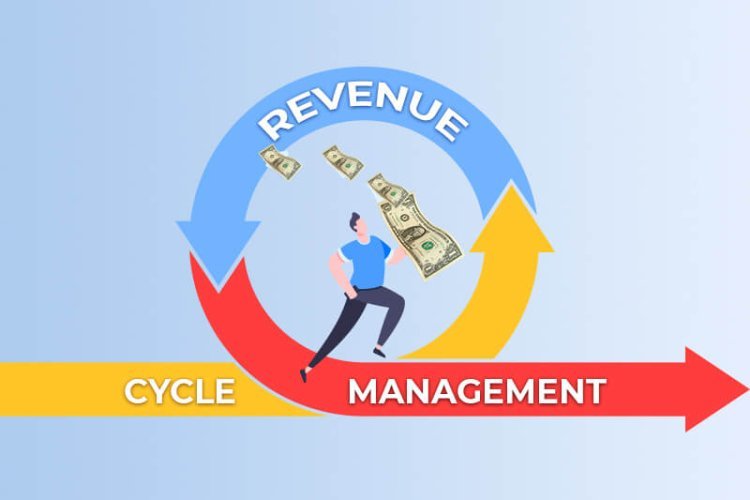Navigating Compliance Challenges in Healthcare Revenue Cycle Management in the USA
In the ever-evolving landscape of healthcare in the United States, revenue cycle management (RCM) stands as a critical pillar supporting the financial health of healthcare organizations.

However, amid regulatory complexities and evolving compliance requirements, managing the revenue cycle poses significant challenges. In this comprehensive guide, we delve into the intricacies of addressing compliance challenges in healthcare RCM, exploring key regulations, emerging trends, and strategies for navigating the terrain effectively.
Understanding Healthcare Revenue Cycle Management
The revenue cycle in healthcare encompasses the entire process of patient care delivery, from appointment scheduling and registration to claim submission, reimbursement, and collection. Effective RCM ensures the timely and accurate capture of revenue while complying with regulations governing billing, coding, and reimbursement.
Compliance Challenges in Healthcare RCM
1. Regulatory Complexity:
- The healthcare industry in the USA is subject to a myriad of regulations, including the Health Insurance Portability and Accountability Act (HIPAA), the Affordable Care Act (ACA), and the Medicare Access and CHIP Reauthorization Act (MACRA). Navigating these regulations requires a comprehensive understanding of their implications on RCM processes.
2. Coding and Documentation Requirements:
- Accurate medical coding and documentation are essential for compliant billing and reimbursement. However, frequent updates to code sets, such as ICD-10-CM and CPT, pose challenges for healthcare organizations in staying current and ensuring compliance.
3. Billing and Claims Submission:
- Billing errors, improper claims submission, and lack of adherence to payer guidelines can result in claim denials and revenue leakage. Compliance with payer-specific requirements and timely submission of clean claims are imperative for maximizing reimbursement.
4. Data Security and Privacy:
- Protecting patient information and ensuring data security are paramount in healthcare RCM. Compliance with HIPAA regulations, including the Security Rule and Privacy Rule, necessitates robust safeguards to prevent data breaches and safeguard patient confidentiality.
5. Fraud and Abuse Prevention:
- Healthcare fraud and abuse, including upcoding, unbundling, and billing for medically unnecessary services, pose significant compliance risks. Implementing effective monitoring and auditing processes is essential for detecting and preventing fraudulent activities.
Strategies for Addressing Compliance Challenges
1. Invest in Training and Education:
- Comprehensive training programs for staff involved in RCM, including coders, billers, and frontline staff, are essential for fostering a culture of compliance. Regular updates on regulatory changes and best practices ensure staff proficiency and adherence to compliance standards.
2. Utilize Technology Solutions:
- Implementing advanced RCM software and technology solutions can streamline processes, enhance accuracy, and facilitate compliance. Automated coding tools, claims scrubbers, and denial management systems help identify errors and mitigate compliance risks.
3. Engage in Continuous Monitoring and Auditing:
- Regular audits of RCM processes, coding practices, and billing documentation enable healthcare organizations to identify compliance gaps and areas for improvement. Conducting internal and external audits helps ensure adherence to regulatory requirements and industry standards.
4. Establish Clear Policies and Procedures:
- Documenting comprehensive policies and procedures for RCM processes, including billing, coding, and claims submission, provides clarity and guidance to staff. Clearly defined roles and responsibilities help mitigate compliance risks and promote consistency.
5. Collaborate with Payers and Partners:
- Establishing collaborative relationships with payers, clearinghouses, and other industry stakeholders fosters communication and alignment on compliance-related issues. Proactively engaging with payers to understand their requirements and expectations enhances compliance and reduces claim denials.
Conclusion
Navigating compliance challenges in healthcare Revenue Cycle Management in USA requires a multifaceted approach encompassing regulatory awareness, technological innovation, and organizational diligence. By addressing key compliance risks and implementing proactive strategies, healthcare organizations can safeguard revenue integrity, mitigate regulatory exposure, and ensure the delivery of high-quality patient care. Embracing a culture of compliance as a fundamental component of RCM fosters trust, transparency, and sustainability in the dynamic healthcare landscape of the USA. As regulations continue to evolve, healthcare organizations must remain vigilant, adaptable, and committed to maintaining compliance excellence in their revenue cycle operations.
What's Your Reaction?











![Wireless Connectivity Software Market Size, Share | Statistics [2032]](https://handyclassified.com/uploads/images/202404/image_100x75_661f3be896033.jpg)




